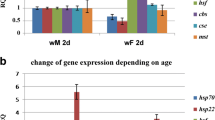Abstract
In the present study, we investigated the effect of hsp70 over expression on some life history components in transgenic fruit flies. We measured life span in mated flies and fecundity in flies subjected or not subjected to a heat shock inducing hsp70. Heat shock increased life span of the parental line, but not of the transgenic lines. Genetic manipulation of the flies altered their fecundity, but the heat shock had no effect on fecundity. To conclude, we have observed some costs of genetic manipulation by itself on life span and fecundity. However, the over expression of thehsp70 extra copies by the exposure to heat did not alter the studied variables.
Similar content being viewed by others
References
Bettencourt BR, Feder ME and Cavicchi S et al. (1999) Experimental evolution of hsp70 expression and thermotolerance in Drosophila melanogaster. Evolution 53: 484-492
Chapman T and Partridge L (1996) Female fitness in Drosophila melanogaster: an interaction between the effect of nutrition and of encounter rate with males. Proc R Soc Lond 263: 755-759
Dahlgaard J, Loeschcke V, Michalak P and Justesen J et al. (1998) Induced thermotolerance and associated expression of the heatshock protein Hsp70 in adult Drosophila melanogaster. Funct Ecol 12: 786-793
Feder ME, Cartańo NV, Milos L, Krebs RA and Lindquist SL et al. (1996) Effect of engineering hsp70 copy number on Hsp70 expression and tolerance of ecologically relevant heat shock in larvae and pupae of Drosophila melanogaster. J Exp Biol 199: 1837-1844
Fleming JE, Walton JK, Dubitski R and Bensch KG et al. (1988) Aging results in an unusual expression of Drosophila heat shock proteins. Proc Natl Acad Sci USA 85: 4099-4103
Golic KG (1991) Site-specific recombination between homologous chromosomes in Drosophila. Science 252: 958-961
Goodman R and Blank M (1998) Magnetic field stress induces expression of hsp70. Cell Stress Chap3: 79-88
Kaiser M, Gasser M, Ackermann R and Stearns SC et al. (1997) P-element inserts in transgenic flies: a cautionary tale. Heredity 78: 1-11
Khazaeli AA, Tatar M, Pletcher SD and Curtsinger JW et al. (1997) Heat-induced longevity extension in Drosophila. I. Heat treatment, mortality, and thermotolerance. J Gerontol 52A: B48-B52
Krebs RA (1999) A comparison of hsp70 expression and thermotolerance in adults and larvae of three Drosophila species. Cell Stress Chap 4: 243-249
Krebs RA and Feder ME (1997a) Deleterious consequences of Hsp70 overexpression in Drosophila melanogaster larvae. Cell Stress Chap 2: 60-71
Krebs RA and Feder ME (1997b) Natural variation in the expression of the heat-shock protein HSP70 in a population of Drosophila melanogaster and its correlation with tolerance of ecologically relevant thermal stress. Evolution 51: 173-179
Krebs RA and Feder ME (1998) Hsp70 and larval thermotolerance in Drosophila melanogaster: how much is enough and when is more too much? J Insect Physiol 44: 1091-1101
Krebs RA and Loeschcke V (1994a) Effects of exposure to shortterm heat stress on fitness components in Drosophila melanogaster. J Evol Biol 7: 39-49
Krebs RA and Loeschcke V (1994b) Costs and benefits of activation of the heat-shock response in Drosophila melanogaster. Funct Ecol 8: 730-737
Krebs RA and Loeschcke V (1994c) Response to environmental change: genetic variation and fitness in Drosophila buzzatii following temperature stress In: Loeschcke V, Tomiuk J and Jain SK et al. (eds) Conservation genetics, pp 309-321. Birkhäuser, Basel
Krebs RA and Loeschcke V (1999) A genetic analysis of the relationship between life-history variation and heat-shock tolerance in Drosophila buzzatii. Heredity 83: 46-53
Le Bourg E (2001) A mini-review of the evolutionary theories of aging. Demogr Res 4: 1-28
Le Bourg E, Valenti P, Lucchetta P and Payre F et al. (2001) Effects of mild heat shocks at young age on aging and longevity in Drosophila melanogaster. Biogerontology 2: 155-164
Lin YJ, Seroude L and Benzer S et al. (1998) Extended life-span and stress resistance in the Drosophila mutant Methuselah. Science 282: 943-946
Lithgow GJ, White TM, Melov S and Johnson TE et al. (1995) Thermotolerance and extended life-span conferred by singlegene mutations and induced by thermal stress. Proc Natl Acad Sci USA 92: 7540-7544
Minois N (2000) Longevity and aging: beneficial effects of exposure to mild stress. Biogerontology 1: 15-29
Minois N (2001) Resistance to stress as a function of age in Drosophila melanogaster overexpressing HSP70. J Insect Physiol 47: 1007-1012
Minois N, Guinaudy MJ, Payre F and Le Bourg E et al. (1999) HSP70 induction may explain the long-lasting resistance to heat of Drosophila melanogaster having lived in hypergravity. Mech Ageing Dev 109: 65-77
Minois N, Khazaeli AA and Curtsinger JW et al. (2001) Locomotor activity as a function of age and life span in Drosophila melanogaster overexpressing HSP70. Exp Gerontol 36: 1137-1153
Nunney L and Cheung W(1997) The effect of temperature on body size and fecundity in female Drosophila melanogaster: evidence for adaptive plasticity. Evolution 51: 1529-1535
Silbermann R and Tatar M (2000) Reproductive costs of heat shock protein in transgenic Drosophila melanogaster. Evolution 54: 2038-2045
Tatar M, Promislow DEL, Khazaeli AA and Curtsinger JW et al. (1996) Age-specific patterns of genetic variance in Drosophila melanogaster. II. Fecundity and its genetic covariance with agespecific mortality. Genetics 143: 849-858
Tatar M, Khazaeli AA and Curtsinger JW et al. (1997) Chaperoning extended life. Nature 390: 30
Warrick JM, Chan HYE, Gray-Board L, Chai Y, Paulson HL and Bonini NM et al. (1999) Suppression of polyglutamine-mediated neurodegeneration in Drosophila by the molecular chaperone HSP70. Nature Genetics 23: 425-428
Welte MA, Tetrault JM, Dellavalle RP and Lindquist SL et al. (1993) A new method for manipulating transgenes: engineering heat tolerance in a complex, multicellular organism. Curr Biol 3: 842-853
Williams GC (1957) Pleiotropy, natural selection, and the evolution of senescence. Evolution 11: 398-411
Author information
Authors and Affiliations
Corresponding author
Rights and permissions
About this article
Cite this article
Minois, N., Vaynberg, S. Fecundity and life span in transgenic Drosophila melanogaster overexpressing hsp70. Biogerontology 3, 301–306 (2002). https://doi.org/10.1023/A:1020103518664
Issue Date:
DOI: https://doi.org/10.1023/A:1020103518664




